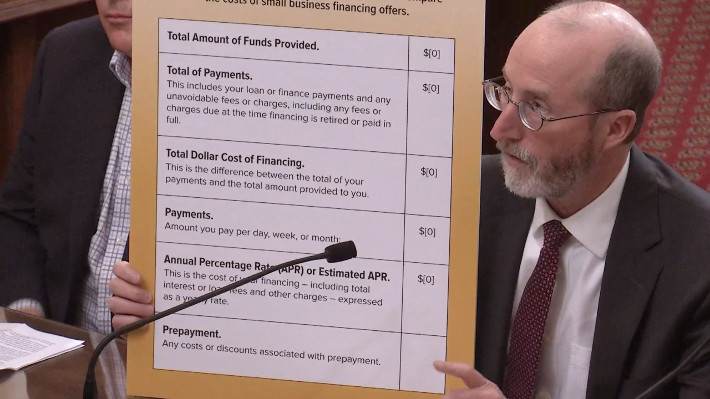Story Series: sb1235
Federal Judge: Legal Challenge to California’s Commercial Financing Disclosure Law Has Merit, Orders SBFA Case to Proceed
April 3, 2023 A federal judge has ordered the Small Business Finance Association’s (SBFA) case against Clothilde Hewlett in her capacity as Commissioner of the California Department of Financial Protection & Innovation (DFPI) to proceed. On March 30, The Honorable R. Gary Klausner denied defendant’s motion to dismiss the claims that the State’s commercial financing disclosure law is both unconstitutional and preempted by the federal Truth in Lending Act (TILA).
A federal judge has ordered the Small Business Finance Association’s (SBFA) case against Clothilde Hewlett in her capacity as Commissioner of the California Department of Financial Protection & Innovation (DFPI) to proceed. On March 30, The Honorable R. Gary Klausner denied defendant’s motion to dismiss the claims that the State’s commercial financing disclosure law is both unconstitutional and preempted by the federal Truth in Lending Act (TILA).
The case, originally filed on December 2, 2022, argued, broadly speaking:
- That the regulations violate the First Amendment on the premise that they compel the group’s members to make inaccurate disclosures to customers while at the same time prohibiting members from engaging in communications that could be used to clarify or correct the required false or misleading information to customers.
- That APR is defined and governed at the federal level by TILA and that California’s own customized spin on it would only serve to confuse customers.
The Court has now ruled that these claims have been sufficiently alleged, allowing the SBFA the opportunity to prove its case.
Steve Denis, the Executive Director of the SBFA, told deBanked that the win at this juncture was validation for what the organization has been saying for the past few years.
“I think [this victory] is really good news. It’s a lawsuit that the entire industry should be behind,” he said.
The outcome of the case could have far reaching effects. New York, for example, has enacted similarly misleading APR rules that are soon slated to go into effect while other states have contemplated following in its footsteps.
“I think if we win this lawsuit the APR argument is over,” Denis said.
To that end, anyone in the industry that would like further information about what’s taking place can contact Denis at sdenis@sbfassociation.org.
New California Disclosure Rules Reduce Capital Available to Small Businesses
March 21, 2023In a poll conducted by a leading trade association, since new CA disclosure rules were implemented in December 2022, 40% of respondents were found to be “no longer lending” to prospective borrowers who fall within the regulations’ threshold of less than $500,000. The poll was conducted by The Secured Finance Network (SFNet), an 80-year-old nonprofit with members representing the $4T U.S. secured finance industry. The new law, requiring sweeping financial disclosures, introduced by CA State Senator Steven M. Glazer in 2018, faced four years of strong opposition before being rolled out in December of 2022.
According to the poll, commercial finance companies would rather not lend to small businesses than comply with what they believe are “misguided and un-compliable” requirements. Mark Hafner, president and CEO of Celtic Capital Corporation, based in Calabasas, CA, said, “Unfortunately, we must now shy away from smaller deals (under the $500k threshold) as the disclosure requirements are extremely complicated to figure out and would require getting our attorneys and CPAs involved to ensure compliance. It’s just not worth the costs involved to fund a small deal anymore. The statute is not user friendly and, frankly, not representative of the true costs as there are numerous assumptions that have to be made to calculate the APR based on the state’s requirements. I honestly don’t think it was designed to meet the stated goal of the statute.”
Robert Meyers, president of Republic Business Credit, which does business with many California-based businesses, explained, “While the fines and penalties are clear under the regulations, the state has been unwilling to confirm our compliance or anyone else’s compliance. That fear is what has stopped 40% of our non-banks from doing business in the state, thus reducing access to capital for small- and medium-sized businesses. I expect this number to increase as time goes on. If the goal of this law was to better inform, it is actually doing the opposite as APR just doesn’t apply to our products.”
SFNet reports that its member companies provide “tens of billions” of capital annually in California to small businesses for essential working capital that funds everything from inventory, to work in process to payroll.
“Forty percent of billions is a large number,” said SFNet CEO, Richard D. Gumbrecht. “In attempting to find a one-size-fits-all solution to financial transparency, the State has created a complex set of requirements that misrepresent the actual cost of borrowing. Lenders are saying it’s not worth the cost and risk of complying. If this sample of 50 lenders is indicative of what we can expect, clearly that was not the intent of the legislation. And considering the demise of Silicon Valley Bank, it’s more important than ever that capital is not restricted in California.” The trade association is working with State legislatures to revise the statute. “Other states have found a simpler and more accurate way to protect small borrowers, and given the unintended consequences we are seeing, we are hopeful California will be receptive to these alternative approaches.”
To demonstrate how vital small businesses are to the U.S. economy, and the importance of not curtailing funding, consider these statistics: According to the U.S. Small Business Association (SBA), small businesses of 500 employees or fewer make up 99.9% of all U.S. businesses and 99.7% of firms with paid employees. Of the new jobs created between 1995 and 2020, small businesses accounted for 62%—12.7 million compared to 7.9 million by large enterprises. A 2019 SBA report found that small businesses accounted for 44% of U.S. economic activity.
About Secured Finance Network
Founded in 1944, the Secured Finance Network (formerly Commercial Finance Association) is an international trade association connecting the interests of companies and professionals who deliver and enable secured financing to businesses. With more than 1,000 member organizations throughout the U.S., Europe, Canada and around the world, SFNet brings together the people, data, knowledge, tools and insights that put capital to work. For more information, please visit SFNet.com.
Media Contact:
Michele Ocejo, Director of Communications
Secured Finance Network
mocejo@sfnet.com, 551-999-5283
California DFPI Seeks to Dismiss Commercial Financing Disclosure Lawsuit
March 17, 2023Clothilde Hewlett, in her official capacity as Commissioner of the California Department of Financial Protection and Innovation, has asked the Court to dismiss the lawsuit over commercial financing disclosures brought by the Small Business Finance Association (SBFA). Both sides have entered in all their arguments (the DPFI filed its reply on March 13th.) It is now up to the Court to decide if the claims survive this stage of litigation.
No More Delays? California Finalizes Commercial Financing Disclosure Rules – Sets December 9th as Effective Date
June 9, 2022 Four years after California passed a commercial financing disclosure law, the debate over what the final rules should be has finally ended. On Thursday, the Department of Financial Protection and Innovation’s rules were approved and published. The law is scheduled to take effect on December 9, 2022.
Four years after California passed a commercial financing disclosure law, the debate over what the final rules should be has finally ended. On Thursday, the Department of Financial Protection and Innovation’s rules were approved and published. The law is scheduled to take effect on December 9, 2022.
The full text of the rules are available here.
Given the length and complexity, readers are advised to consult with a knowledgeable attorney for the best immediate interpretation of the language and its implications. The rules cover merchant cash advance, factoring, leasing, and various forms of lending.
To read up on the history of this law, you can review our past coverage.
California’s Business Loan & MCA Disclosure Law Is Nearing Finality
April 13, 2021 Nearly three years after California became the first state to pass a business loan and merchant cash advance disclosure law (SB 1235), the actual disclosure rules themselves are finally nearing completion. The public has until April 26th to submit any comments on the amended portions of the proposed rules.
Nearly three years after California became the first state to pass a business loan and merchant cash advance disclosure law (SB 1235), the actual disclosure rules themselves are finally nearing completion. The public has until April 26th to submit any comments on the amended portions of the proposed rules.
The 52-page document is the result of years of negotiations between various parties that all have a stake in its implementation. Among the finer details are the characteristics of the fonts permitted in the disclosures, what column a certain disclosure can be placed in, and the aspect ratio of the columns themselves.
But that’s the easy part. Here’s the hard part, according to a brief published in Manatt’s newsletter yesterday.
“The modified regulations continue to require use of the annual percentage rate (APR) metric, rather than annualized cost of capital (ACC), to disclose the total cost of financing as an annualized rate. This appears to be a final decision, which will make it difficult if not impossible for many commercial finance companies to comply given the significant challenges of calculating APR on products with substantial variance in the amounts and timing of payments or remittances.”
Manatt highlights other issues, including that all the necessary disclosures be provided “whenever a payment amount, rate, or price is quoted based on information provided by the proposed recipient of financing…”
This requirement, the firm says, is not even required under Federal Regulation Z for consumer loans.
“Many companies will not be able to comply with this requirement absent radical changes to their California application and underwriting procedures, as it is common today for companies to have preliminary discussions with applicants about potentially available financing terms before full underwriting has been completed.”
Manatt’s newsletter on the issue can be found here.
Any interested person may submit written comments regarding SB 1235’s modifications by written communication addressed as follows:
Commissioner of Financial Protection and Innovation
Attn: Sandra Sandoval, Regulations Coordinator
300 South Spring Street, 15th Floor
Los Angeles, CA 90013
Written comments may also be sent by electronic mail to regulations@dfpi.ca.gov with a copy to jesse.mattson@dfpi.ca.gov and charles.carriere@dfpi.ca.gov.
The last day to submit comments is April 26, 2021
California DBO Making Progress On Finalizing Rules Required By The New Disclosure Law
July 29, 2019 Last October, California Governor Jerry Brown signed a new commercial finance disclosure bill into law. The bill, SB 1235, was a major source of debate in 2018 because of its tricky language to pressure factors and merchant cash advance providers into stating an Annual Percentage Rate on contracts with California businesses. The final version of the bill, however, delegated the final disclosure format requirements to the State’s primary financial regulator, the Department of Business Oversight (DBO).
Last October, California Governor Jerry Brown signed a new commercial finance disclosure bill into law. The bill, SB 1235, was a major source of debate in 2018 because of its tricky language to pressure factors and merchant cash advance providers into stating an Annual Percentage Rate on contracts with California businesses. The final version of the bill, however, delegated the final disclosure format requirements to the State’s primary financial regulator, the Department of Business Oversight (DBO).
The DBO then issued a public invitation to comment on how that format should work. They got 34 responses. Among them were Affirm, ApplePie Capital, Electronic Transactions Association, Commercial Finance Coalition, Fora Financial, Equipment Leasing and Finance Association, Innovative Lending Platform Association, International Factoring Association, Kapitus, OnDeck, PayPal, Rapid Finance, Small Business Finance Association, and Square Capital.
On Friday, the DBO published a draft of its rules along with a public invitation to comment further. The 32-page draft can be downloaded here. The opportunity to comment on this version of the rules ends on Sept 9th.
You can review the comments that companies submitted previously here.
California Now Requires Mandatory Disclosures on Commercial Finance
October 1, 2018California Governor Jerry Brown has signed SB 1235.
As of Jan 1, 2019, commercial finance companies in California will be required to disclose the following on their contracts:
(1) The total amount of funds provided.
(2) The total dollar cost of the financing.
(3) The term or estimated term.
(4) The method, frequency, and amount of payments.
(5) A description of prepayment policies.
(6) The total cost of the financing expressed as an annualized rate.
To find out if this bill affects your company, contact an attorney.
The California Business Loan & MCA Disclosure Bill Has Passed
August 30, 2018The bill has passed. With the governor’s signature, all business loan contracts and merchant cash advance contracts in California will soon require a uniform set of formal disclosures including an annualized rate of the total cost. The precise formula for that rate will be determined by the state’s regulatory agency, the Department of Business Oversight.
Update: The bill’s death in committee was challenged by the bill’s author, Senator Steve Glazer, and ultimately allowed to come up for a vote after he complained to the senate majority leader that a committee’s decision is merely a recommendation, not a deciding factor on the bill itself. At 2:10 AM EST, it passed.
Update: The bill has died in the Senate Banking Committee. Daniel Weintraub, who serves as chief of staff to the bill’s author, tweeted after midnight eastern time that the bill was not moving forward.
Thanks to all who supported small business and #SB1235. Unfortunately the Senate Banking Committee killed the bill tonight. We fell one vote short of the four we needed to send the bill to the Senate floor. https://t.co/30ztdW2LbD
— Daniel Weintraub (@DMWeintraub) September 1, 2018
Update: The bill passed the Assembly unopposed and is slated for a late night vote by the Senate Banking Committee.
Update 8/31/18: Today is the last day for the legislature to pass this bill. We will keep you updated
California’s bill to mandate certain disclosures on business loan and merchant cash advance contracts is looking a little bit worse. The Annualized Cost of Capital method (Explained here) that some folks in the industry were accepting of, has been scrapped in favor of whatever formula a state regulator decides to pick. That means if the Commissioner of Business Oversight decides on an APR disclosure, which many industry trade groups believed they had already successfully lobbied against, all loans and non-loans alike would have to report an APR, a mathematical impossibility for a product like merchant cash advance. At present, however, all that is known is that the Commissioner’s choice must be an annualized metric.
According to Bloomberg, the amended version of the bill needs to get approval in both the Assembly and the Senate by Friday before the legislative session ends.
Trade associations that have weighed in on this bill include the Electronic Transactions Association, Commercial Finance Coalition, Small Business Finance Association, and the Innovative Lending Platform Association.
You can view all of our previous coverage about the bill here.





























